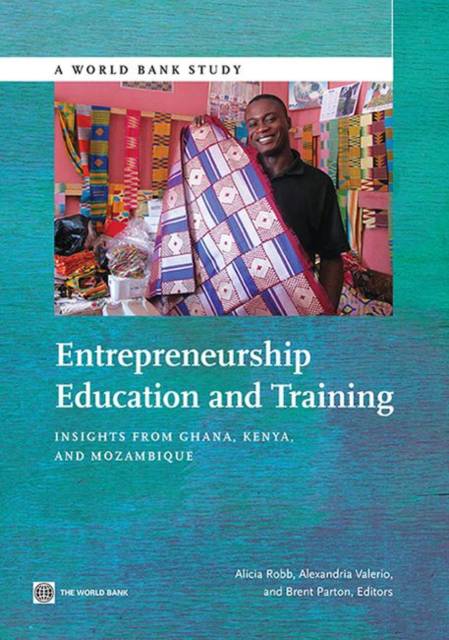
- Afhalen na 1 uur in een winkel met voorraad
- Gratis thuislevering in België vanaf € 30
- Ruim aanbod met 7 miljoen producten
- Afhalen na 1 uur in een winkel met voorraad
- Gratis thuislevering in België vanaf € 30
- Ruim aanbod met 7 miljoen producten
Zoeken
Entrepreneurship Education and Training
Insights from Ghana, Kenya, and Mozambique
Alicia Robb, Alexandria Valerio, Brent Barton
€ 50,95
+ 101 punten
Omschrijving
"Empirical research has found that entrepreneurial activity correlates positively with innovation and job creation, and governments around the world have shown a growing interest in interventions that promote entrepreneurial success. However, research on whether entrepreneurial success can be taught has reached mixed conclusions, and even the landscape of what is being taught is poorly known. This study looks closely at entrepreneurial education and training (EET) programs in three case study countries in Africa-Kenya, Ghana, and Mozambique-which are all experiencing sustained economic growth and diversification in their private sectors. It draws on both global and country-specific research and on the experience of stakeholders in the case countries. The study identifies practical insights relevant to various target groups, intended outcomes, and social and economic contexts. Overall, it paints a comprehensive picture of both the context for entrepreneurship and the landscape of programs in the case countries. Among its key findings are these: (i) Key macroeconomic trends give reason for optimism about the trajectory of private sector development, but serious barriers to entrepreneurship remain in each country. Corruption, prohibitively high taxes, and burdensome regulatory regimes remain impediments, along with crime. Stakeholders interviewed (potential and practicing entrepreneurs) also cite cultural disincentives and lack of access to finance. (ii) The EET program landscape is highly varied. The programs often emerge as responses to urgent challenges, such as urban youth unemployment, but in the aggregate they target a wide range of learners, from secondary students to university business majors to rural women, and their focus ranges from poverty reduction to attitudinal change. (iii) Too many programs are insufficiently tailored to their participants' backgrounds and needs, attempting to use a single curriculum with participants of varying ages, educational backgrounds, and expectations. (iv) Whereas stakeholders believe business acumen and an entrepreneurial mindset are key to business success, few programs address this. (v) Finally, stakeholders express a strong desire for more business community mentorship and for better access to finance; these are areas that some programs do address, and with positive results, but much more is needed. The findings in this report can inform EET policy and program dialogue at multiple levels, guiding the investment decisions that policymakers and government institutions must make and more clearly indicating where further research in the EET realm is most needed."
Specificaties
Betrokkenen
- Auteur(s):
- Uitgeverij:
Inhoud
- Aantal bladzijden:
- 124
- Taal:
- Engels
- Reeks:
Eigenschappen
- Productcode (EAN):
- 9781464802782
- Verschijningsdatum:
- 10/06/2014
- Uitvoering:
- Paperback
- Formaat:
- Trade paperback (VS)
- Afmetingen:
- 178 mm x 254 mm
- Gewicht:
- 231 g

Alleen bij Standaard Boekhandel
+ 101 punten op je klantenkaart van Standaard Boekhandel
Beoordelingen
We publiceren alleen reviews die voldoen aan de voorwaarden voor reviews. Bekijk onze voorwaarden voor reviews.











